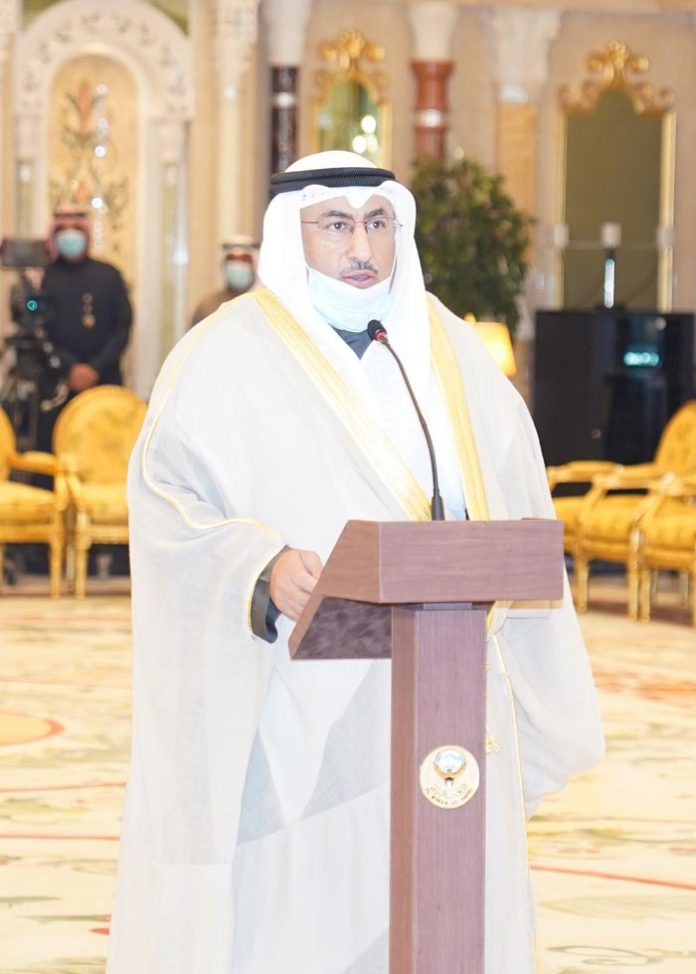During the extraordinary session, the National Assembly discussed the government’s work program for the sixteenth legislative term for the years (2021/2022 – 2023/2024).
Deputy Prime Minister and Minister of Oil and Minister of Electricity and Water Muhammad Al-Faris said that “the government is ready to present its work program and the council approved the request.
Al-Faris spoke, saying: “The vision of 2035 adopted by the State of Kuwait continues to achieve the goals,” noting that “the success of comprehensive reform requires awareness, responsibility and cooperation between the Parliament and the government.”
Al-Faris explained that the government’s work program includes 4 axes — implementing the economic reform program, restructuring the public sector, developing human capital, improving human infrastructure and renewable energies.
Al-Faris gave a visual presentation of the government’s work program, indicating that “Kuwait has basic components and the government’s work program is a road map,” which are components (international reputation – social components – institutional components – natural components – geographic components) and pointed out that “there are major challenges facing the country such as structural imbalances in the national economy and public finance and the accumulated deficit in the state’s general budget over the next five years, without fiscal reform, is expected to reach between 45 and 60 billion dinars.
This is in addition to low productivity of the public sector, including the high level of government participation in providing services, which prevents the private sector from participating in economic activities; weak human capital, including the low quality of education, as the level of the twelfth grade graduate is sufficient for the level of the seventh grade graduate in the countries of the income approach with Kuwait and low infrastructure efficiency and lack of harmony between them.
On the other hand, Al-Faris confirmed that “Sustainability of Social Security” has set a slogan for the government’s work program to confirm sustainability, which is in the interest of the citizen and aims to raise the quality of his life.
He pointed out that there are 11 pillars with 86 initiatives, including the quality of education 5 initiatives, the labor market 7 initiatives and health care 5 initiatives.
Al-Faris presented the references to the government’s work program, including the policies of the development plan. He reviewed the axis of the economic reform program in the initiative to establish economic zones, including the Abdali Economic Zone, where the person responsible for it, the Investment Promotion Authority, presented the time limit for the initiative and implementation steps.
For his part, Minister of Finance Abdul Wahhab Al-Rasheed said that Kuwait is in the 46th place with regard to e-government, and we look forward to becoming the 30th, and there are 72,000 employees in the private sector, looking forward to raising their number to 100,000 in 2025.
He continued, “The main catalyst for any radical reform is the provision of land, and we are looking forward to reforms in the subsidy clause and the financing of the housing program,” and pointed out that the price of a barrel of oil is our standard, and the budget break-even price is about $90, and we aspire to reduce it to $70.
In turn, the Chairman of the Civil Service Bureau, Maryam Al-Aqeel, said that “the private sector must be relied upon and the government’s role changed from operator to regulator,” noting that “one of the pillars of the government’s work program is developing the administrative structure, enhancing integrity and combating corruption.”
She said, “The government should consider and develop its services, such as health, education and the rest of the institutions, and we need government services to be flexible and for there to be distinguished services provided by the government with changing policies and reconsidering organizational structures, and operating from public and private companies in order to avoid the entanglement experienced by the government.”
Minister of Education Ali Al-Mudhaf said that the government’s work program includes developing school curricula to contribute to the formation of effective human capital in accordance with the labor market and improving the quality of outputs.
Secretary-General of the Supreme Council for Planning spoke about the “Work Makers Program that provides Kuwaiti youth to the private sector,” and pointed out the importance of “addressing the shortage in the labor market for some professions, including nursing.” He also touched on an initiative to change the way of life and make it healthier through the “Our Playgrounds” program.
He added: “The government’s work program includes focusing on women’s economic empowerment and entrepreneurship, especially since the percentage of women occupying leadership positions does not exceed 21 percent, as well as empowering people with disabilities in the labor market, society and small and medium enterprises.”
Minister of Municipality and Communications Rana Al-Faris said one of the pillars of the government’s work program is to improve the infrastructure index, the index of access to electricity and the quality of its production, pointing out that Kuwait possesses the human and financial resources that enable it to improve its ranking in international competitions and added, “Funding continues in development projects, and we will stop projects that do not bring economic and social returns.”

















